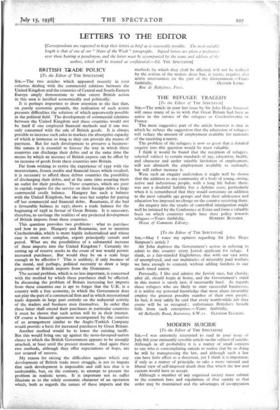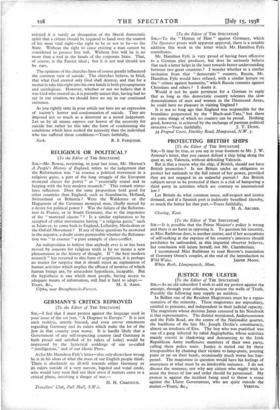MODERN SUICIDE
[To the Editor of THE SPECTATOR] SIRS I was extremely interested to read in your issue of July 8th your eminently sensible article on the subject of suicide. Although in all probability it is a matter of small concern to one who is contemplating suicide to realise that by so doing he will be transgressing the law, and although such a law can have little effect as a deterrent, yet I think it is important, if only as a matter of principle, to take a more rational and liberal view of self-imposed death than that which the law and custom would have us accept.
Although a member of any organised society must submit to the .common laws and regulations of that society so that order may be maintained and the advantages of co-operation enjoyed it is surely an abnegation of the liberal democratic spirit that a citizen should be required to hand over the control of his most vital right—the right to be or not to be—to the State. Without the right to cease existing a man cannot be considered to possess free will. Without free will he is no more than a tool in the hands of the corporate State. That, of course, is the Fascist ideal ; but it is not and should not be ours.
The opinions of the churches have of course greatly influenced the common view of suicide. The churches believe, in brief, that what God created only God shall destroy, and that for a mortal to take this right into his own hands is both presumptuous and sacrilegious. However, whether or not we believe that- it was God who created us, it is patently unjust that, having had no say in our creation, we should have no say in our continued existence.
As you rightly state in your article our laws are an expression of society's horror and condemnation of suicide. They are imposed not so much as a deterrent as a moral judgement. Let us by all means express our horror of the necessity for suicide but rather let this take the form of condemning the conditions which have evoked the necessity than the individual who has suffered those conditions.—Yours faithfully,











































 Previous page
Previous page